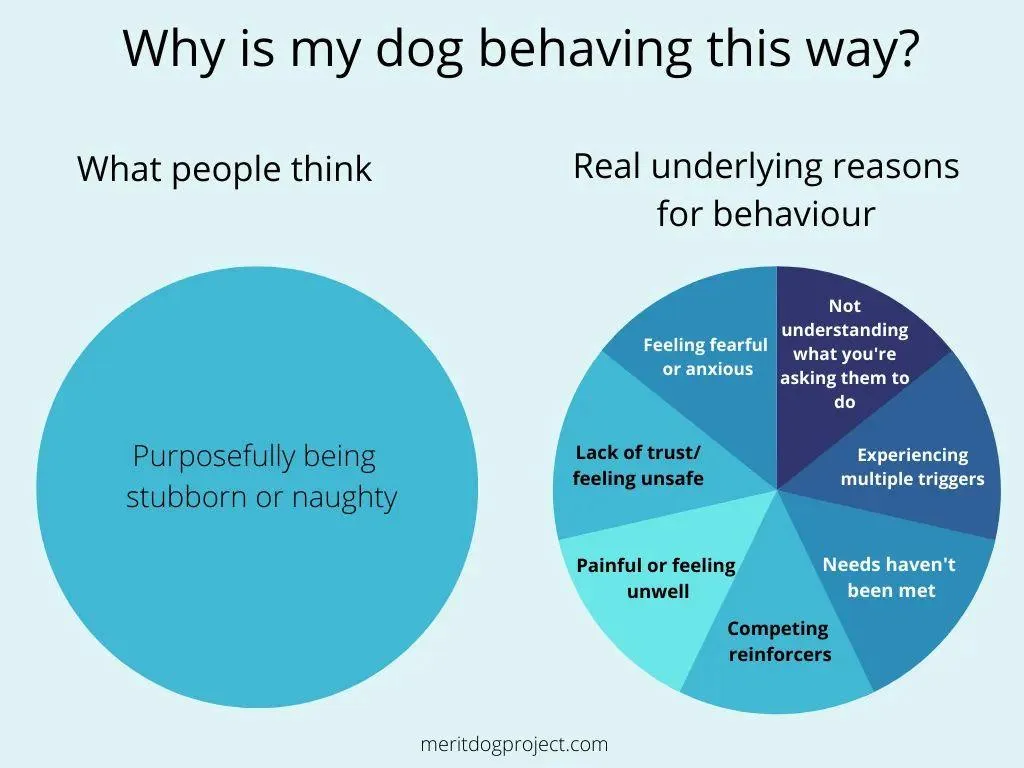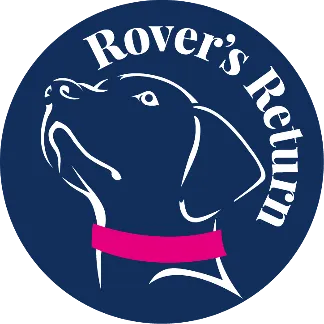Book a FREE 1:1 Assessment Call By Clicking HERE
Specialising In Dog Reactive Behviour
Accredited by APDT, ABTC and UK DOG Behaviour and Training Charter
Qualified and Experienced
Force Free Trainer and Behaviourist
Dog Training Leicestershire Educational Blogs

A Guide To Reactive Dog Behaviour Training
“Desensitising is an effective method of behaviour change. But this alone will not solve the problem. A strategic plan by a behaviourist is the best method of behaviour change.” - Sam Hughes
Reactive dog training tips from a professional behaviourist in Leicester
You got a dog because you wanted to enjoy walks with it and socialise in the park with other owners and dogs, but it hasn’t turned out that way. It's difficult, it's stressful. I get it, I have a reactive dog.
Dealing with a reactive dog can be a challenging experience for any dog owner. Reactivity in dogs is a common behavioural issue that can manifest in various ways, including barking, growling, lunging, and biting.
In this article, we will explore the causes of reactivity in dogs, how to manage and train a reactive dog, and the importance of seeking professional help when necessary. Whether you are a new or experienced dog owner, understanding how to deal with a reactive dog can help you provide your furry friend with the care and support they need.
What Is Dog Reactivity?
I don’t like the term reactivity. I don’t like to label the behaviour. However, the term does identify that the dog has some issues that they need to communicate.
Let’s look at reactivity as any adverse reaction in the presence of triggers.
Reactivity in dogs is a complex issue that can stem from a variety of factors, including genetics, early socialisation experiences, and traumatic events. Some breeds are more prone to reactivity than others, but any dog can develop this behaviour under certain circumstances.
Reactive dogs may display aggressive or fearful behaviours when they encounter unfamiliar people, animals, or situations. It is important to understand that reactivity is not the same as aggression and that it can be managed with proper training and support. However, ignoring or downplaying reactivity can lead to more severe behavioural problems down the line.
As a responsible dog owner, it is crucial to recognise the signs of reactivity and take action to address them.
picture credit to Grisha Stewart Bat Training https://grishastewart.com/bat-overview/
Understanding ReactivityIt is important to understand that there is always a why! Dogs don’t do ‘just because’ their behaviour is always due to the emotions that they are feeling at that time. They do not possess the ability to pretend or fake behaviour.
There are several reasons why the dog feels that it is necessary to act that way.
Here a a few reasons why reactive behaviour occurs in your pet dog
Negative Experiences
One of the most common reasons for your dog showing reactive behaviour is an association with a negative event or experience. When your dog feels unsafe, threatened or uncomfortable they are more likely to display a negative behaviour response.
Continual exposure towards triggers or events will grow reactive behaviours, and the behaviour will be displayed in other scenarios and become a regular standard level of behaviour.
Health, pain and medications.
It can be difficult to understand when your dog is in pain. The survival instinct will often hide the side effects of pain. If your dog is displaying sudden heightened negative behavioural responses then the 1st stage should be a vet check to rule out pain. I have experienced several bite incidents that have been linked to the dog being in severe pain.
Poor health and certain medications can contribute toward reactive type behaviours. Ensure that they have a healthy diet, regular access to water and receive regular vet checks.
Breeding
Reactivity can be set before you get your puppy. If the parents are reactive this can be passed to the dog. If the bitch experienced stress during the pregnancy this can be passed to the puppy
Early removal from parents and siblings can have an adverse effect on behaviour as the dog learns valuable information in the early weeks of life.
Early Experiences
A lack of effective exposure, habituation and socialisation to their environment including sounds, sight of animals, vehicles, people, novel environments and objects can make the world a scary place for a dog.
Poor Diet
When you feed your dog processed foods it can block the production of dopamine and serotonin. Serotonin is the feel-good hormone and regulates the mood. A lack of this will make your dog more likely to be reactive.
The Removal of The Dogs Options
Putting on the lead removes the dog's options for flight (the fight or flight adrenalin response) this is a likely cause for barrier or lead reactivity.
The same experience can be felt when you punish the dog for displaying adverse behaviours.
All behaviour is necessary for your dog. It's communicating how they are feeling. When you tell your dog to be quiet, jerk the lead to make them stop, or place a halti on to stop lunging you are removing their communication response. However, the need for the behaviour is still there and must be managed so the brain will adopt alternative behaviours to enable your dog to cope. These behaviours will likely be an escalation of the previous behaviours.
How to manage and train a reactive dog
The years of studies in psychology have taught us that it is possible to change behaviour.
This blog discusses how to help your reactive dog.
Managing and training a reactive dog requires patience, consistency, and a deep understanding of canine behaviour. The first step is to identify the triggers that cause your dog to react and avoid exposing them to those situations as much as possible. Keeping a diary can help you identify the triggers.Being aware of those triggers and helping your dog feel safe will help.
You need an understanding of the dog's communication skills. Through their body language, your dog communicates their feelings, and when you listen and understand, the behaviours can be diverted before they become a problem, this can be powerful for your dog and will reduce the rehearsal of the behaviours in future experiences.
You can use counter-conditioning and desensitisation techniques to gradually teach your dog to associate the trigger with positive experiences. This involves rewarding your dog for calm and relaxed behaviour around the trigger.
Additionally, training can help build your dog's confidence and trust in you. It is important to remain calm and avoid punishing or scolding your dog for reactive behaviour, as this can worsen the problem. With proper management and training, many reactive dogs can learn to become more confident and relaxed in various situations.
You should look for a gradual reduction in your dog's behaviour and not a sudden behaviour change.
Effective training takes patience, time and understanding.
The importance of seeking professional help
Reactivity is a behavioural issue and should be assessed by a qualified and experienced behaviourist.
While managing and training a reactive dog can be helped with the right knowledge and tools, it is important to recognise when professional help is needed. It can be difficult to understand the complex psychology of the behaviour and essential aspects can be missed, meaning that you are only scratching the surface and the behaviour will not change long term.
A certified dog behaviourist can provide expert guidance on how to address your dog's specific issues and create a customised training plan. They can also help you identify any underlying medical conditions that may be contributing to your dog's reactivity. Seeking professional help early on can prevent the problem from escalating and ensure that your dog receives the best possible care. Additionally, if your dog's reactivity poses a risk to other animals or people, seeking professional help is not only recommended but necessary for everyone's safety.
Desensitising is an effective method of behaviour change. But this alone will not solve the problem. A strategic plan by a behaviourist is the best method of behaviour change.
A holistic approach through assessment of the dog's behaviour including the family, diet, environment, breeding, early life and much more will determine the function of the behaviour. A plan can be formed for effective behaviour change.Conclusion
In conclusion, dealing with a reactive dog can be a daunting task, but with the right approach, giving them the space to feel safe and the time for effective behaviour change it is possible to help your furry friend overcome their issues and become a happy and well-adjusted companion.
Understanding the causes of reactivity, implementing effective management and training strategies, and seeking professional help when necessary are all important steps in this process. With patience, consistency, and compassion, you can provide your dog with the care and support they need to thrive.
Rovers Return Training Academy based in Ullesthorpe, Leicestershire specialises in reactive dog behaviour and offers programs and long-term strategies for effective behaviour change.To speak to me about your issues book a FREE pre-assessment call here
https://api.leadconnectorhq.com/widget/bookings/discovery-call-11
Highly Qualified Behaviourist
Accredited by APDT, ABTC and UK DOG Behaviour and Training Charter
Accredited Scentwork Instructor
Force Free Trainer and Behaviour
Force Free Trainer and Behaviour
Accredited Scentwork Instructor
Accredited by APDT, ABTC and UK DOG Behaviour and Training Charter
Highly Qualified Behaviourist
Contact Us
Sam: 07725 802995
You can contact us via Live Chat button at the bottom of the screen or the contact box to the right.
You can also book one of our services online using the View Dates buttons under the service you require.
© 2023 by Rovers Return Dog Trainers Academy - Force Free Dog Training Lutterworth, Broughton Astley, Leicestershire, Hinckley, Nuneaton, Stoney Stanton, South Kilworth, Ullesthorpe
Privacy Policy | Terms and Conditions | Terms and Conditions of Services | Sitemap











Facebook
Instagram
X
LinkedIn
Youtube
TikTok